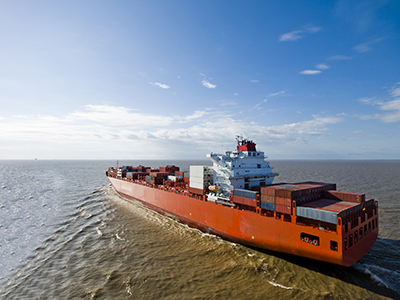With emissions restrictions from ships in place, independent design and engineering company Foreship emphasizes that consultation on technical solutions should start with the needs of the shipowner in mind, not the scrubber manufacturer
Lower oil prices over the last six months have led owners to revisit the assumptions on which they based their fuel choices in the run up to sulphur content restrictions within Emissions Control Areas, effective after January 1, 2015.
All available options to meet ECA restrictions – a switch to lower sulphur fuel, continuation with heavy fuel oil in combination with abatement technology (scrubbers), or a more radical conversion for LNG as a fuel – involve cost penalties.
Exhaust gas scrubber makers made good market progress in 2014 as the new emissions rules loomed, but sustained lower oil prices from October 2014 do not mean that heavy fuel oil becomes newly more attractive as a marine fuel than LNG. Marine Gas Oil prices are now also lower, which shakes up the cost assumptions upon which upfront exhaust gas scrubber costs have been explained away.
For those operating existing ships within European ECAs, vessel age, working profile and beneficial ownership have been key factors in the decision-making matrix; one problem is the lack of fresh advisory sources on which to call, in the new circumstances. However, that is independent of any specific technology provider’s agenda does exist.
 Finnish design and engineering company Foreship is engaged by owners to undertake surveys, do feasibility work and offer design and installation consultancy across a range of newbuild and retrofit work, and currently has around 150 live projects. The projects include wide-ranging work on cruise ships, ferries, offshore and cargo vessels, but in recent times Foreship has been carving out a consultancy niche as a neutral party involved in scrubber work.
Finnish design and engineering company Foreship is engaged by owners to undertake surveys, do feasibility work and offer design and installation consultancy across a range of newbuild and retrofit work, and currently has around 150 live projects. The projects include wide-ranging work on cruise ships, ferries, offshore and cargo vessels, but in recent times Foreship has been carving out a consultancy niche as a neutral party involved in scrubber work.
As well as offering independent advice and recommendations to shipowners on equipment makers and shipyards, the company project manages and coordinates stakeholders, according to Foreship Vice President Business Development Mattias Jörgensen (pictured) . Foreship has worked with the highest profile exhaust gas scrubber makers in the market, as well as shipyards in Sweden, Poland and Estonia to date.
“We are hired to make sure the choices put before our clients are independently assessed,” Jörgensen says. “Neutrality in technology selection is highly prized, and our experience offers us insights that are not available to others.”
Foreship has extensive experience in working with cruise ship exhaust gas scrubber installations, but it has most recently been called in to consult on more than 10 ship projects involving scrubbers retrofitted to vessels operating in the Baltic Sea ECA. The cost and configuration of each project varied in line with the specifications and age of the ships, while both of these factors also influenced maker selection, according to Jörgensen.
“In fact, the technologies involved in the various systems are quite similar. There might be a small variation, for example, in electrical power consumption or effluent treatment systems, but in general they are directly comparable.”
Lauri Haavisto, Managing Director Foreship, adds: “This is still a developing technology. Today, the biggest challenge is how to integrate the system with the ship and we are part of the improvement process. Our opinion is that the exhaust gas scrubbers available now are sufficient for the regulations as they exist today; but keep in mind that the whole technology is quite new in this application. It will be interesting to see what the future holds for open loop scrubbers.”
Haavisto says that speeding up scrubber installation needs to be an area of focus to address the proposed wider restriction of emissions from ships, whether that adheres to the current IMO global schedule for 2020 implementation or a post-review 2025 deadline.
“In terms of retrofitting, the installation process could be easier, and one of the problems is how long the process takes. Certainly, the retrofit process should be more efficient and less time-consuming to make scrubber technology a more competitive technical solution after sulphur content restrictions that apply in ECAs go global.”
In the start, I was open with you propecia before and after has changed my existence. It has become much more fun, and now I have to run. Just as it is incredible to sit.






























































